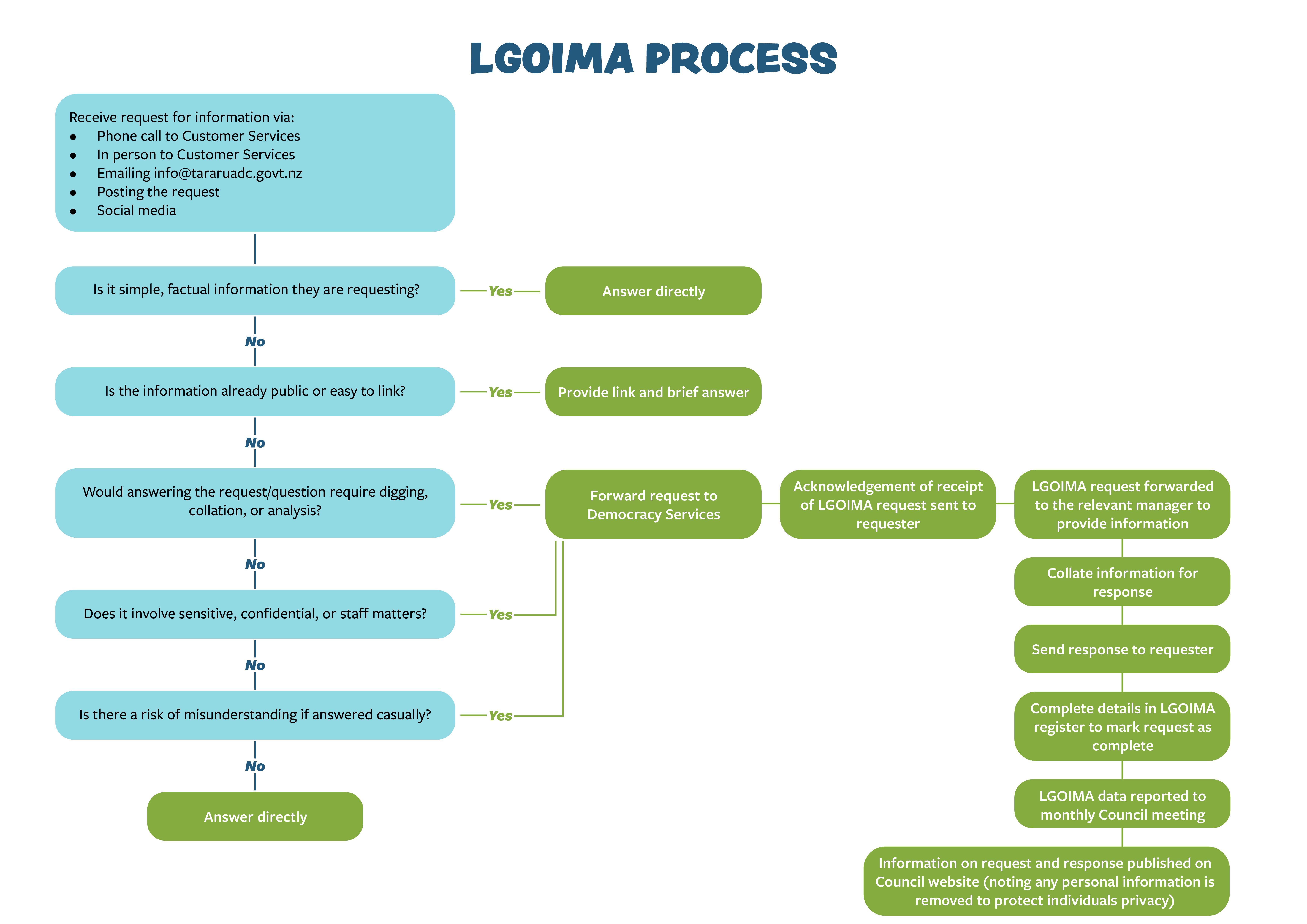Requests for Official Information and Personal Information
The Tararua District Council is committed to promoting openness and transparency in its dealings, and makes a large amount of information available through our websites.
However, if you cannot find the information you want, please contact us by:
- Phoning our Customer Service Team: 06 374 4080 (north) or 06 376 0110 (south)
- Asking in person at our Customer Service Centres
- Emailing: info@tararuadc.govt.nz
- Posting your request to: Manager - Democracy Services, Tararua District Council, PO Box 115, Dannevirke 4942
Please be as specific as you can be in making your request; it helps us to find the information quickly for you. Make sure you include either a postal or email address so we can provide you with a response.
Under the Local Government Official Information and Meetings Act 1987 (LGOIMA) any person may request official information from the Council. Individuals can also request their own "personal information" under the Privacy Act 2020. You do not have to specify that your request is being made under LGOIMA or the Privacy Act. Note that in your Privacy Act request, you must provide a copy of your identification.
We will acknowledge your request and you will receive the information within 20 working days. You can use the calculator from the Office of the Ombudsman to determine when the 20 working days expire.
However, if your request is complex, involves a large amount of research and collation, or requires us to consult with other parties, and we cannot provide you with the information within 20 working days, we may extend the time limit. We will let you know if there is a need to do this.
If the information you want is held by another organisation covered by the Act, we may transfer your request to that agency. If we transfer your request, we will let you know within 10 working days of receiving your request.
The information will be provided if it is held by the Council, unless good reason for withholding exists under LGOIMA and the information is not outweighed by the "public interest" test under LGOIMA.
The specific reasons enabling us to withhold information are set out in sections 6 and 7 of the Local Government Official Information and Meetings Act 1987. The most common reasons to withhold information are to:
- protect peoples' privacy;
- maintain legal privilege;
- enable the Council to carry on its commercial activities.
The LGOIMA also sets out administrative reasons for requests to be refused, these include:
- the information will soon be publicly available;
- the information does not exist or cannot be found;
- the information cannot be made available without substantial collation or research.
Where a request is refused or information is withheld, the Council must give its reasons and advise the person making the request that there is a right to have the decision reviewed by an Ombudsman. Similarly, some of the above grounds apply to the Privacy Act and right of review is via the Privacy Commissioner.
Generally, there will be no charge for your request. Occasionally however, if a request is for a significant amount of information, or requires substantial collation and research, we may consider imposing a charge.
The amount we would charge for official information, taking into account guidelines set down by the Ministry of Justice, is specified within Council's Fees and Charges.
If we are going to charge you, we will advise you of the cost of processing your request before we begin working on it. You can then decide if you want to continue, withdraw or refine your request. We may ask you to pay some or all of this cost in advance.
The Council cannot charge for Privacy Act requests.
Please read the Council's Privacy Statement on the following page: Privacy Statement | Tararua District Council
The Office of the Ombudsman provides information about making a LGOIMA request for official information and guidance to follow.
If you are not satisfied with our response to your request for official information, you can complain to the Office of the Ombudsman.
The Office of the Privacy Commissioner provides information about your privacy rights and asking for your information. If you are not satisfied with our response to your request for information or correction to information, you may be able to make a complaint to the Privacy Commissioner.
